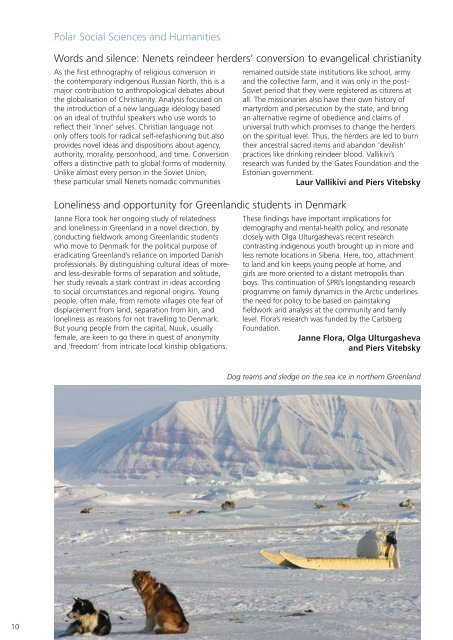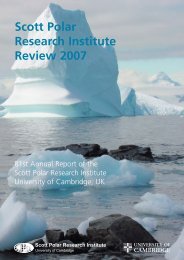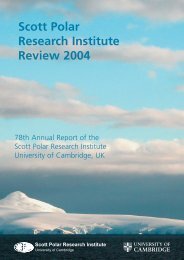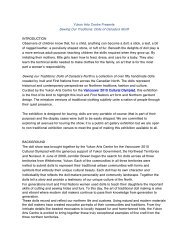PDF version of SPRI Review 2011 - Scott Polar Research Institute ...
PDF version of SPRI Review 2011 - Scott Polar Research Institute ...
PDF version of SPRI Review 2011 - Scott Polar Research Institute ...
You also want an ePaper? Increase the reach of your titles
YUMPU automatically turns print PDFs into web optimized ePapers that Google loves.
<strong>Polar</strong> Social Sciences and Humanities<br />
Words and silence: Nenets reindeer herders’ con<strong>version</strong> to evangelical christianity<br />
As the first ethnography <strong>of</strong> religious con<strong>version</strong> in<br />
the contemporary indigenous Russian North, this is a<br />
major contribution to anthropological debates about<br />
the globalisation <strong>of</strong> Christianity. Analysis focused on<br />
the introduction <strong>of</strong> a new language ideology based<br />
on an ideal <strong>of</strong> truthful speakers who use words to<br />
reflect their ‘inner’ selves. Christian language not<br />
only <strong>of</strong>fers tools for radical self-refashioning but also<br />
provides novel ideas and dispositions about agency,<br />
authority, morality, personhood, and time. Con<strong>version</strong><br />
<strong>of</strong>fers a distinctive path to global forms <strong>of</strong> modernity.<br />
Unlike almost every person in the Soviet Union,<br />
these particular small Nenets nomadic communities<br />
remained outside state institutions like school, army<br />
and the collective farm, and it was only in the post-<br />
Soviet period that they were registered as citizens at<br />
all. The missionaries also have their own history <strong>of</strong><br />
martyrdom and persecution by the state, and bring<br />
an alternative regime <strong>of</strong> obedience and claims <strong>of</strong><br />
universal truth which promises to change the herders<br />
on the spiritual level. Thus, the herders are led to burn<br />
their ancestral sacred items and abandon ‘devilish’<br />
practices like drinking reindeer blood. Vallikivi’s<br />
research was funded by the Gates Foundation and the<br />
Estonian government.<br />
Laur Vallikivi and Piers Vitebsky<br />
Loneliness and opportunity for Greenlandic students in Denmark<br />
Janne Flora took her ongoing study <strong>of</strong> relatedness<br />
and loneliness in Greenland in a novel direction, by<br />
conducting fieldwork among Greenlandic students<br />
who move to Denmark for the political purpose <strong>of</strong><br />
eradicating Greenland’s reliance on imported Danish<br />
pr<strong>of</strong>essionals. By distinguishing cultural ideas <strong>of</strong> moreand<br />
less-desirable forms <strong>of</strong> separation and solitude,<br />
her study reveals a stark contrast in ideas according<br />
to social circumstances and regional origins. Young<br />
people, <strong>of</strong>ten male, from remote villages cite fear <strong>of</strong><br />
displacement from land, separation from kin, and<br />
loneliness as reasons for not travelling to Denmark.<br />
But young people from the capital, Nuuk, usually<br />
female, are keen to go there in quest <strong>of</strong> anonymity<br />
and ‘freedom’ from intricate local kinship obligations.<br />
These findings have important implications for<br />
demography and mental-health policy, and resonate<br />
closely with Olga Ulturgasheva’s recent research<br />
contrasting indigenous youth brought up in more and<br />
less remote locations in Siberia. Here, too, attachment<br />
to land and kin keeps young people at home, and<br />
girls are more oriented to a distant metropolis than<br />
boys. This continuation <strong>of</strong> <strong>SPRI</strong>’s longstanding research<br />
programme on family dynamics in the Arctic underlines<br />
the need for policy to be based on painstaking<br />
fieldwork and analysis at the community and family<br />
level. Flora’s research was funded by the Carlsberg<br />
Foundation.<br />
Janne Flora, Olga Ulturgasheva<br />
and Piers Vitebsky<br />
Dog teams and sledge on the sea ice in northern Greenland<br />
10








